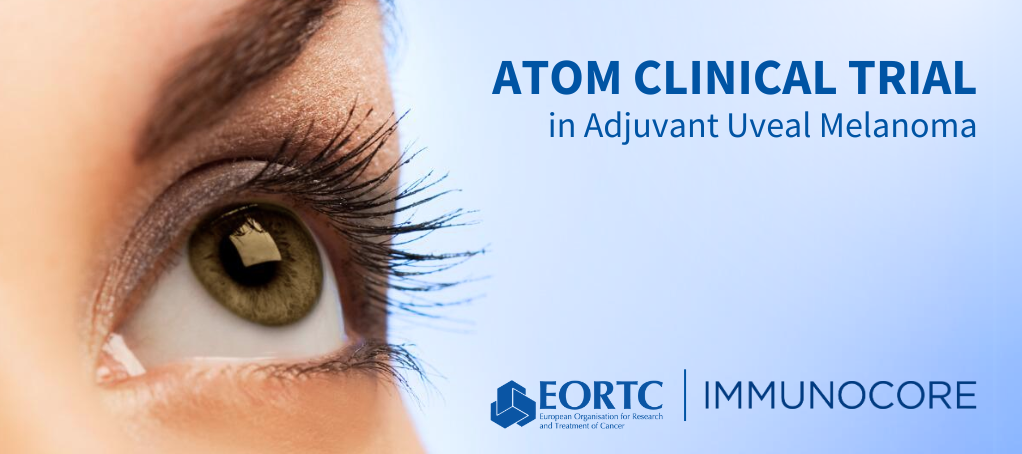EORTC and Immunocore are collaborating to launch the ATOM clinical trial of tebentafusp in Adjuvant Uveal Melanoma
7 Nov 2023
The European Organisation for Research and Treatment of Cancer (EORTC) is pleased to announce a collaboration with Immunocore, which marks the beginning of the ground-breaking clinical trial ATOM investigating the adjuvant treatment of uveal melanoma with tebentafusp.
This partnership marks a crucial step forward in our mission to enhance the prognosis and treatment options for individuals facing uveal melanoma, a rare and challenging form of eye cancer. Together with Immunocore, we are committed to pushing the boundaries of scientific research to develop innovative therapeutic interventions that will potentially improve the lives of those affected by this condition.
“Tebentafusp is the first therapy proven to improve survival in HLA-A*02:01 patients with metastatic uveal melanoma1 and as a result has become a new standard of care. The next major challenge is to establish whether tebentafusp can reduce the chance of relapse in HLA-A*02:01 patients following treatment for high-risk primary uveal melanoma. The ATOM trial will test whether 6 months of adjuvant tebentafusp will improve relapse-free survival and has been keenly awaited by our patients and the international uveal melanoma clinical community. I am delighted that the EORTC/Immunocore collaboration facilitates this critical study.”
– Professor Paul Nathan PhD FRCP, ATOM study coordinator
About Uveal Melanoma
Uveal melanoma is a rare disease arising from the pigmented uveal tract of the eye with an incidence in Europe of 4.4 cases per million. Metastases usually appear within a median of 3-5 years after treatment of high-risk primary tumours and treatment of metastatic disease is usually with palliative intent. Very few studies have tested the use of adjuvant treatment in uveal melanoma, and none have resulted in any change in the standard of care reflecting a previous lack of active agents for this disease.
About tebentafusp
Tebentafusp is a first-in-class bispecific soluble protein comprising a T-cell receptor (TCR) that binds to a peptide from the gp100 protein presented on tumour cells by human leukocyte antigen (HLA)-A*02:01, and an antibody binding fragment directed against CD3 expressed on T cells. Gp100 is normally expressed in cutaneous and uveal melanocytes and is overexpressed in both skin and uveal melanoma. Tebentafusp recruits T cells to target and kill gp100+ tumour cells.
A recent study2 demonstrated that tebentafusp prolongs overall survival as compared with the investigator’s choice (IC) of pembrolizumab, ipilimumab, or dacarbazine in first-line metastatic uveal melanoma (HR=0.68, 95% CI: 0.54-0.87 with durable benefit seen at the 3 years landmark.
About ATOM
ATOM is an EORTC-led randomized open-label international multicentre phase III superiority clinical trial aiming to prospectively assess whether adjuvant treatment with tebentafusp improves relapse-free survival as compared with observation. A total of 290 patients will be enrolled within a span of three years, beginning in 11 countries, and with the potential for further expansion. The anticipated First Patient, First Visit (FPFV) date is in the second half of 2024.
The goal of the experimental treatment strategy in our trial is to establish whether adjuvant tebentafusp increases the proportion of patients who do not develop metastatic disease and therefore cures a proportion of patients who would have otherwise relapsed.
Patients with high-risk primary ocular melanoma included in the study must have undergone definitive treatment by surgery or radiotherapy, be HLA-A*02:01 positive, have a good performance status (ECOG 0/1), and adequate organ function. Eligible patients will be randomized 1:1 to receive either active treatment with weekly tebentafusp or observation. Patients will receive tebentafusp for 6 months, or until relapse.
The secondary objectives are to compare overall survival and to further document the safety and tolerability of tebentafusp.
The exploratory objectives include the comparison of the health-related quality of life between the treatment arms and the evaluation of the role of circulating tumour DNA (ctDNA) as a biomarker for the presence of residual disease.
References:
1 Nathan et al NEJM 2021; 385: 1196-206
2 Hassel et al NEJM 2023 published online Oct 21st, 2023
Related News
Meet the new EORTC Board
9 Jul 2024
We are pleased to announce the release of the EORTC 2023 Annual Report
17 Jun 2024
Dr Denis Lacombe, EORTC CEO, appointed stakeholder co-chair of ACT EU advisory group
24 May 2024
Clinical Trials Day 2024: a Q&A on pragmatic clinical trials
20 May 2024
EORTC/EMA workshop suggests an international way forward for treatment optimisation studies
8 May 2024
EORTC’s Participation at the ESTRO Congress 2024
29 Apr 2024
EORTC: Advancing research and treatment for rare cancers
29 Feb 2024
EORTC Fellowship Programme: celebrating more than 20 years of impactful collaboration
22 Feb 2024
Appointment of Malte Peters as EORTC Strategic Alliance Officer
9 Feb 2024
Unique series of workshops in partnership with the European Medicines Agency (EMA)
7 Feb 2024


